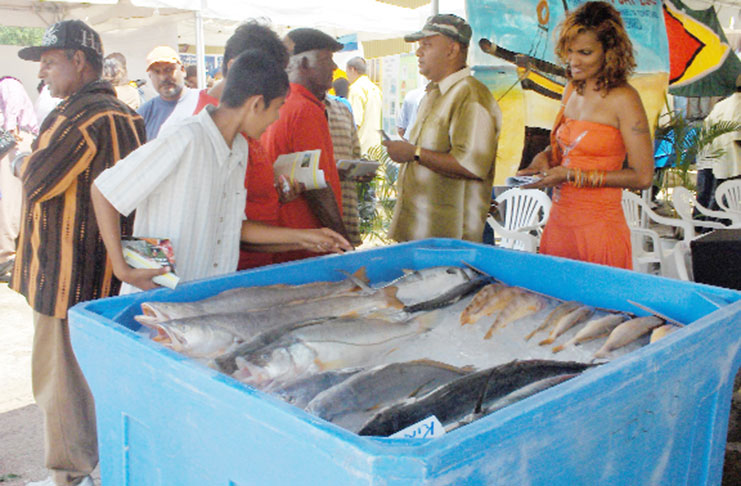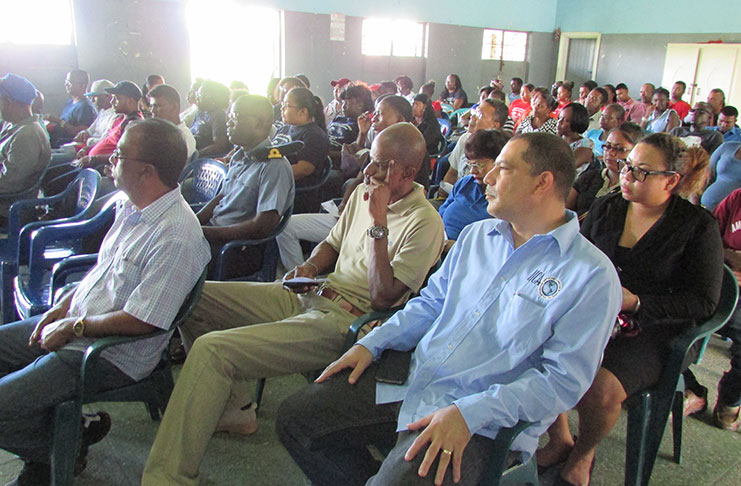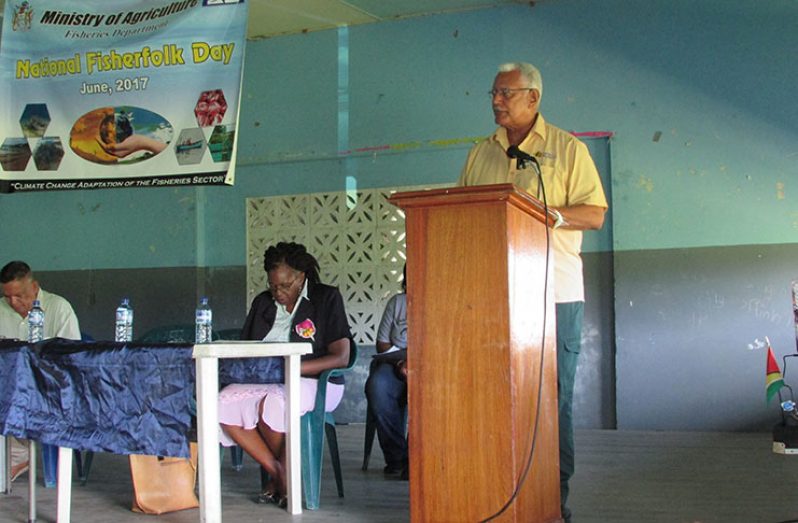IN recent times a number of fishermen have been reporting that most of the fish they catch for sale have gone further out at sea, and so, they seem to feel that climate change and the uncertain weather conditions may have something to do with this.
In a recent interview with the Pepperpot Magazine, the Chief Fisheries Officer, Mr Denzil Roberts said that it is true that fishermen in Guyana are spending more time at sea on every trip and even venturing further out at times. “It is noted that climate change can modify the environment in which fishes live and can cause their migration, which can cause migration of fish stocks,” he said. “Whilst this can be a factor, other factors that can cause this are the increased number of fishers, modification and/or the introduction of new fishing methods and overfishing, illegal, unreported and unregulated (IUU) fishing.”

He went on to say that any physical or chemical factor that is different to the environment that marine resources live in will cause an effect. Additionally, he said that the recent hurricanes in the Caribbean have caused damages to the boats and equipment and possible fishing areas within the areas affected. This, of course, will affect the harvesting of fish in those areas, Mr Roberts posited.
Fisher Folks Day 2017
The Chief Fisheries Officer drew attention to the recently concluded Fisher Folks Day in which the Minister of Agriculture, Noel Holder, in his discourse with fishermen, spoke about the seriousness of climate change which they were experiencing. The theme was ‘Climate Change Adaptation of the Fisheries Sector.’
On that occasion, the Agriculture Minister said: “We know the challenging nature of the profession and unfortunately while we overcome most of them, new and emerging challenges appear. One such challenge is climate change. I am sure all would have heard about this and the varying reactions worldwide.
“We have been hearing about climate change and its effects globally. Of course, these effects will impact on Guyana and its economic activities. Make no mistake; climate change is real and present. We in Guyana have cause for worry, as we are a vulnerable nation with our low lying coast and tropical rainforest that can be impacted negatively by adverse climate conditions,” he noted, while stating that the Fisheries sector of Guyana plays a vital role in ending hunger, achieving food security, improving basic nutrition and the socio-economic stability of many Guyanese, both directly and indirectly. These attributes of the sector are at the heart of the Sustainable Development Goals (SDG).
The threat of climate change
According to the Minister, “Climate change threatens our ability to achieve global food security, eradicate poverty and achieve sustainable development. Climate change in the aquatic ecosystems is severe and widespread.
“The impacts of climate change, variability and extreme weather events are compounding threats to the sustainability of capture fisheries and aquaculture development in marine and freshwater environments. Ensuring food security in the face of climate change is among the most daunting challenges facing humankind,” he said.
The Minister posited that while some of the problems associated with climate change are emerging gradually, action is urgently needed now to allow the aquatic ecosystem to adapt and become resilient over time.

Fish catch decline by 2050
The ocean and the aquatic ecosystems are keys to regulating our world’s climate, as it is the largest natural carbon sink. However, the ocean is currently absorbing carbon at an alarming rate and the results lead to the acidification, which in turn transforms the aquatic ecosystem, the minister told the gathering of fishers.
He said that by the year 2050, the Food and Agriculture Organisation (FAO) estimates that catches of main fish species will decline by 40 percent in the tropics. The impact of climate change on the fisheries sector are likely to occur as a result of changes in the air and sea temperature, ocean currents, rising sea levels, wind patterns and extreme climate events, including flooding, hurricanes, etc.
These changes will not only affect the fish but will have social and economic consequences for the people dependent on the fisheries sector, the Minister said.
As a result of climate change, the fisheries sectors can be impacted the following way or area:
The production and ecology of fish stocks may see a decrease in species abundance, composition and distribution. These, in turn, will directly affect production and yield.
Climate change, which is said to threaten the very livelihood of the fishers and many others who depend on the fisheries sector as a source of income.
In terms of infrastructure such as landing lists, processing plants and aquaculture ponds, he said that these are threatened by the rising sea level, flooding and an increase in the level of salinity in our fresh water supply.
Additionally, the increase fishery operation effort will be greatly impacted due to fishers having to travel further offshore and increasing their catching effort to maintain yield.
Then the economy, he posited will be affected as a result of a reduction of export of fish and related products and the national economic development may be greatly affected.
Embrace climate change
The Minister urged fishers to embrace the theme of Fisherfolk Day which ensures that adaption and mitigation are on-going social learning processes that integrate policies, strategies and scientific knowledge from national, regional and international communities.” It is important, he said, “that we continue to develop methods, tools and approaches for climate change assessment and adaptation.”
At the folk day, the Minister told the fishers, “Though we are small in size we must play our part in helping to reduce the advance of climate change.”
He said that playing our part means not throwing litter in the oceans and waterways, especially plastics, also avoid spillage of chemical and fuels; Use climate-smart fishing gear and technology that reduce the impact on the marine life and reduce our carbon footprint. These and other measures will ensure that we can benefit from incentives and other forms of help to further reduce our impacts on the environment.
Minister Holder said that in an effort to mitigate effects of climate change on the fisheries sector certain measures can be adapted, such as the establishment of marine and coastal protected areas through management and planning for the protection of breeding ground for fish stock.
He said that there must also be an increased access for fishers to have technical, financial and material resources to assist where necessary; and there must also be the development and implementation of management systems for our marine resource, which will involve local communities in the protection and conservation of the fish stock.
Sequentially he said, this will enhance the fishers’ knowledge on the potential effect of climate change.
The minister made it known to the fishers that during the coming years the administration will be proceeding with these and other measures so, “You can become more responsible fishers and be able to guarantee that the marine resources will be there for a long time to come.”
(mercilinburke2017@gmail.com)




.png)









